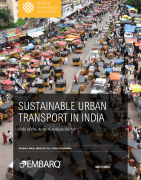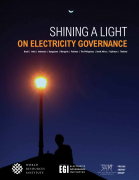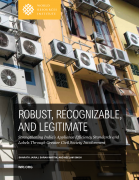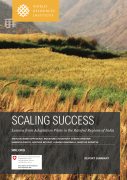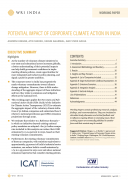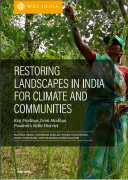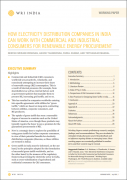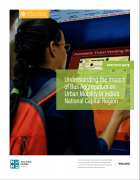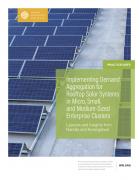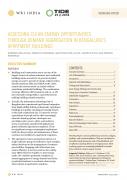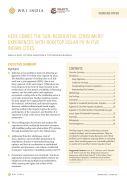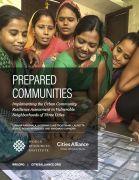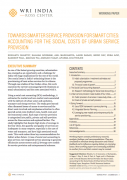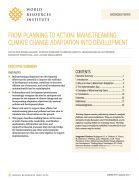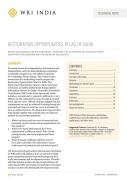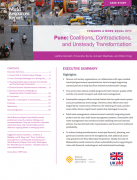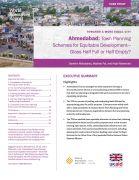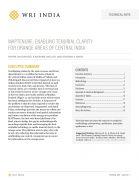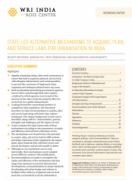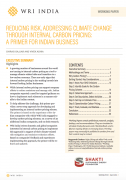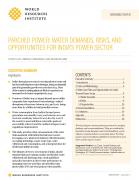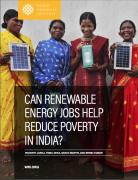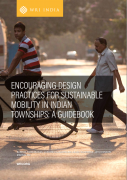Publications
WRI is committed to producing high-quality research, including reports, working papers, issue briefs, and fact sheets. Our publications are subject to peer review, and are held to traditional "academic" standards of excellence, such as objectivity and rigor.
All of our publications are available to download. You may obtain hard copies of select WRI reports at no charge (except shipping and handling) through our print publications catalog.
Subscribe to get notified of new publications or get the RSS feed.
-
Potential Impact of Corporate Climate Action in India
by , , e -As climate commitments and initiatives by non-state and subnational actors increase globally, a better understanding of their potential impacts can help draw better projections to support better climate policy planning and implementation. Many large Indian businesses have committed to ambitious...
-
Restoring Landscapes in India for Climate and Communities
by , , , e -Restoring landscapes can bring economic, environmental, and social prosperity to people and the planet. In the Sidhi District of India’s Madhya Pradesh state, the opportunity is massive. By adapting the popular...
-
How Electricity Distribution Companies In India Can Work With Commercial And Industrial Consumers For Renewable Energy Procurement
by , , e -As a result of a multitude of factors, such as national and international commitments to Renewable Energy (RE), falling RE prices, government regulation promoting RE, and the advent of sustainability targets, Commercial and Industrial (C&I) consumers all over the world have begun to actively...
-
Understanding the Impact of Bus Aggregators on Urban Mobility in India’s National Capital Region
by , e -Demand-responsive bus services provided by technology-led companies are a recent entry into the transportation ecosystem in cities across the world. Known as bus aggregators in India, these companies are capitalizing on limited mobility options in India’s expanding cities. Bus aggregators...
-
Implementing Demand Aggregation for Rooftop Solar Systems in Micro, Small, and Medium-Sized Enterprise Clusters
by , , e -India has 63.3 million Micro, Small, and Medium-Sized Enterprises (MSMEs). 31% of these are manufacturing units, which account for 25 percent of the industrial sector’s energy consumption. Advancing the implementation of clean energy measures in the MSME sector can play a key role in India’s...
-
Assessing Clean Energy Opportunities Through Demand Aggregation in Bengaluru’s Apartment Buildings
by , , , , e -India has ambitious renewable energy targets, a portion of which must be met through rooftop solar in residential buildings. Major Indian cities are seeing a trend towards gated apartment buildings (or apartment complexes). In these buildings, apartment residents share common areas that provide...
-
Here Comes the Sun
by , e -This working paper documents residential consumers’ experiences with solar rooftop PV systems. The data is captured through household surveys conducted across five Indian cities. The study is an attempt to understand the challenges faced by residential consumers at various stages of their...
-
Prepared Communities
by , , , e -Climate change affects poor and marginalized communities first and hardest. Particularly in cities, a lack of access to basic services, a long history of unsustainable urban development, and political exclusion render the urban poor one of the most vulnerable groups to climate induced natural...
-
Towards Smarter Service Provision for Smart Cities
by , , , , , , , , e -India is one of the fastest growing countries in the world and urbanisation is both a challenge and an opportunity for India with huge implications for the rest of the world. One critical concern for India’s urbanising future is the provision of basic urban services for all its citizens. Using a...
-
From Planning to Action
by , , , , e -As extreme weather events become more frequent and stronger, it is critical that policymakers and development practitioners incorporate climate change adaptation objectives into their sectoral policies and plans. This process, called mainstreaming, has the potential to improve the resilience of...
-
Restoration Opportunities Atlas of India
by , , , , , e -This publication was originally published on WRI.
Protecting forests from degradation, deforestation and fragmentation, and tree-based landscape restoration are globally recognized...
-
Mapping Social Landscapes: A Guide to Identifying the Networks, Priorities, and Values of Restoration Actors
by , , , , , , , , e -This publication was originally published on WRI.
The guidebook takes a new approach to environmental governance by focusing on...
-
Pune: Civil Society Coalitions, Policy Contradictions, and Unsteady Transformation
by , , e -This case study in the World Resources Report, “Towards a More Equal City,” examines the processes of transformative change and the conditions both enabling and inhibiting it in Pune, the second largest city in Maharashtra state, India. Many initiatives across diverse sectors have had a positive...
-
Ahmedabad: Town Planning Schemes for Equitable Development — Glass Half Full or Half Empty?
by , e -This case study in the World Resources Report, “Towards a More Equal City,” examines transformative urban change in Ahmedabad, India, by analyzing the land pooling and readjustment mechanism called Town Planning Scheme (TPS). This paper reviews the evidence on whether the TPS mechanism has...
-
MAPTenure: Enabling Tenurial Clarity for Orange Areas of Central India
by , e -More than half the villages of Madhya Pradesh and Chhattisgarh are affected by a peculiar issue of tenurial ambiguity called “orange areas.” This issue impacts nearly 1.2 million hectares and 1.5 million, largely poor, landless and tribal families, that depend on these lands for food, fuel,...
-
State-led Alternative Mechanisms to Acquire, Plan, and Service Land For Urbanisation in India
by , , e -- Rapidly urbanizing Indian cities need mechanisms to ensure that land is acquired, planned, and serviced with adequate infrastructure and social amenities, to prevent the occurrence of haphazard urban expansion and under-provisioned inner-city areas.
- Such mechanisms should help ...
-
Reducing Risk, Addressing Climate Change Through Internal Carbon Pricing
by e -A growing number of businesses around the world are turning to internal carbon pricing as a tool to manage climate-related risks and transition to a low-carbon economy. There are early signs that internal carbon pricing is making inroads into progressive Indian businesses as well. But the early...
-
Parched Power: Water Demands, Risks, and Opportunities for India’s Power Sector
by , e -This paper aims to help decision-makers understand the magnitude of water issues for the thermal power sector in India with quantitative evidence. There is a significant data gap in power plant water use in India. The authors used data science techniques and innovative methodologies and...
-
Can Renewable Energy Jobs Help Reduce Poverty in India?
by , , e -India launched a massive renewable energy push in 2014 — a move that could bring electricity and jobs to poor, rural communities across the country. The government set ambitious targets to generate 160 gigawatts of wind and solar power by 2022, and a study from the Council on Energy, Environment...
-
Encouraging Design Practices for Sustainable Mobility in India: A Guidebook
by , , , e -Encouraging Design Practices for Sustainable Mobility in Indian Townships: A Guidebook, is WRI India’s publication that highlights the role of urban design interventions that can be applied in townships or gated communities in cities, that promote the use of sustainable modes such as walking,...

